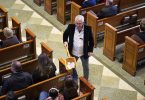
Ross Conner, center, a member of St. Bernard Parish in Wamego, was recently awarded the James Madison Fellowship by the James Madison Memorial Foundation in pursuit of his master’s degree in history. He is pictured with other Madison fellows, Troy Hemphill, left, and Shawn Hornung. PHOTO COURTESY OF TROY HEMPHILL
by Susan Fotovich McCabe
Special to The Leaven
WAMEGO — These days, the U.S. Constitution is a hot-button discussion topic in homes and businesses and on both sides of the political aisle.
Its interpretation fuels passionate debates — even within school classrooms where students are first exposed to the historical document and its impact on current events.
High school teacher Ross Conner is front and center for those discussions. He teaches world and American history, as well as AP European history, at Wamego High School.
Conner, a member of St. Bernard Parish in Wamego, was recently awarded the James Madison Fellowship by the James Madison Memorial Foundation in pursuit of his master’s degree in history. The fellowship is designed to strengthen teaching about the Constitution in the nation’s secondary schools and provides up to $24,000 toward the cost of earning a master’s degree.
As part of the competition, applicants must submit an essay explaining why studying the history and principles of the Constitution are critical in sustaining American democracy.
“American democracy and the principles of the Constitution are not only intertwined, they are co-dependent upon one another; without one, the other withers,” Conner wrote in his essay for the fellowship.
“The truth is that without the expression of individuals in American democracy,” he wrote, “the principles of the Constitution, such as limited government, will disappear. The themes of the Constitution hinge on the American people’s involvement in the democratic process.
“In studying history and the Constitution we find both the ‘why’ and the ‘how’ to become part of the American story.”
Conner has been teaching at Wamego High School for the last three years. Prior to that, the former Prince of Peace, Olathe, parishioner and St. Thomas Aquinas, Overland Park, graduate taught theology at a Catholic middle and high school in Junction City.
Two of his co-workers, who are former recipients of the same award, encouraged Conner to apply. They described the experience as “life-changing,” he said.
“I was motivated by the opportunity to talk with top scholars in the field. It will make me a better teacher and will be a tremendous opportunity to take what I’ve learned into my classroom,” he said.
This summer, Conner will begin his master’s program by taking courses on campus at Ashland University in Ashland, Ohio, and then online during the school year. The emphasis will be on the study of America’s founding documents — the Constitution and the Declaration of Independence.
Next summer, he will complete his education during a one-month stay at Georgetown University in Washington, D.C.
Throughout the experience, Conner will reflect on the impact history has in the classroom. In this time of tremendous polarization in our country, he believes teaching history to young people is more important than ever.
“For so long, we’ve been taught to avoid discussing religion and politics at the dinner table,” Conner said. “But what has happened is that we’ve forgotten how to talk about it in a civil way.”
In his essay, Conner emphasized that teaching the principles of the Constitution is vitally important.
“It is not a set of rules or even just a primary source document from 240 years ago,” he wrote. “It is a living, breathing document, and the first word of the Preamble, ‘we,’ denotes who exactly gives it that life.
“It not only outlines our individual rights and liberties, but it provides a means for active popular sovereignty. My job as a teacher is not just to explain the importance of rights, amendments and court decisions, but rather to demonstrate how to live out the liberties they ensure.”
Despite the separation of church and state, Conner believes a fundamental understanding of religion is integral to teaching the history of the Constitution and he relies on his faith to put it into perspective for others.
“My Catholic faith acts almost as a lens through which I view the Constitution and the other founding documents,” Conner said. “I have a certain perspective about the importance of freedom of expression of speech and religion.
“For some people, those ideas don’t matter as much, maybe because they don’t feel like they have much to lose. Being able to discuss these differing viewpoints in the classroom gives students a working example of constitutional principles.”
Teachers are often plagued by doubts as to whether they are making a difference. However, Conner says most teachers choose to stay in the field because of the positive impact they feel they can make on students. It’s a challenge Conner welcomes.
“My hope is that my students will get something out of my history lessons,” Conner said. “A lot of kids are disenchanted with politics and are sick of it.
“Ultimately, they will either check out or change it.”






